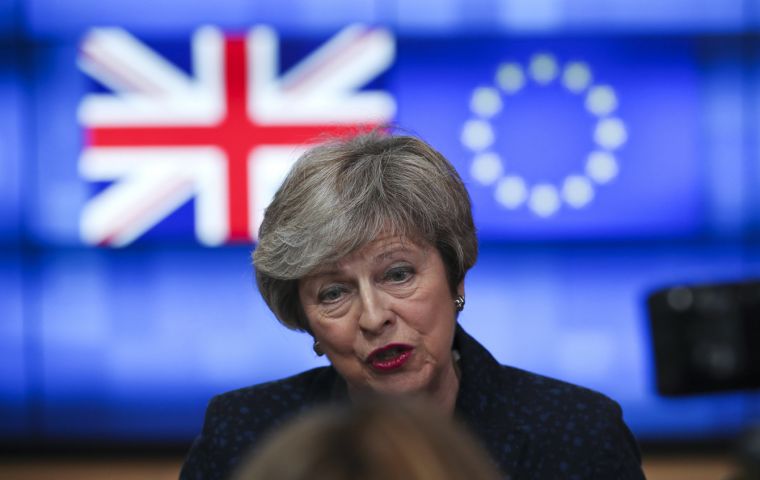MercoPress. South Atlantic News Agency
On supposed official Brexit departure day, Commons expected to vote withdrawal agreement
 Theresa May was essentially asking MPs to turn it into a game of two halves - just voting on the first part of the deal which sorts out the UK's departure and leaving the longer term part for the next
Theresa May was essentially asking MPs to turn it into a game of two halves - just voting on the first part of the deal which sorts out the UK's departure and leaving the longer term part for the next  MPs will be debating the motion on the day the UK was supposed to leave the European Union - 29 March.
MPs will be debating the motion on the day the UK was supposed to leave the European Union - 29 March. MPs will be asked to vote again on Brexit on Friday but only on part of the deal negotiated with the EU. They will vote on the withdrawal agreement on the Irish “backstop”, divorce bill and citizens' rights. But it will not amount to a third “meaningful vote” on the deal, as it will not include a vote on the UK's future relationship with the EU.
Amid anger from MPs, Andrea Leadsom said it was “crucial” if the UK wanted to secure a Brexit delay until 22 May. MPs will be debating the motion on the day the UK was supposed to leave the European Union - 29 March.
BBC political editor Laura Kuenssberg said Theresa May was essentially asking MPs to turn it into a game of two halves - just voting on the first part of the deal which sorts out the UK's departure and leaving the longer term part for the next few weeks.
But it is still not certain it will get through - both Labour and the Democratic Unionist Party say they will vote against the withdrawal agreement on Friday.
Labour leader Jeremy Corbyn said the withdrawal agreement could not be separated from the political declaration “because otherwise you move into a blindfold Brexit”.
The DUP's deputy leader Nigel Dodds said he was not expecting äny last minute rabbits out of the hat“ that would change the party's position.
He told the BBC that the DUP was concerned about plans for ”a trade border between Northern Ireland and the rest of the UK and what that would mean in terms of who makes our laws - not Stormont or Westminster“.
The PM's deal includes a withdrawal agreement - setting out how much money the UK must pay to the EU as a settlement, details of the transition period, and the backstop arrangements - and a political declaration on the way the future EU-UK relationship will work.
Last week the European Council agreed to postpone Brexit beyond the expected date of 29 March - offering an extension until 22 May, if MPs approved the withdrawal agreement by the end of this week.
If not, it offered a shorter delay until 12 April - the date by which the UK would have to indicate whether it would stand candidates in the 2019 European Parliament elections - allowing the UK time to get the deal through or to ”indicate a way forward“.
BBC Brussels reporter Adam Fleming said the official conclusions from last week's summit only mention the need to pass the withdrawal agreement by Friday, not the political declaration.
Leader of the Commons Mrs Leadsom told MPs that the European Council would only agree to the 22 May extension if MPs approved the withdrawal agreement by 23:00 GMT on Friday.
”It's crucial therefore that we make every effort to give effect to the council's decision and tomorrow's motion gives Parliament the opportunity to secure that extension,“ she said.
”I think we can all agree that we don't want to be in the situation of asking for another extension and facing the potential requirement of participating in European Parliament elections.“
But she faced anger from some MPs. Labor's Mary Creagh described it as an ”extraordinary and unprecedented reverse ferret of the commitments that have been made... that we should have our say on both items together“.
Friday's vote would not allow Parliament to ratify the withdrawal package, because Brexit legislation allows this only after the passage of a ”meaningful vote“ on both the Withdrawal Agreement and a Political Declaration on the future relationship.
The government would either have to pass part two of the deal - the political declaration on the future relationship - at a later date, or change the law so that it is not needed to ratify the treaty.
Some MPs questioned the government's motion, with Labor's Valerie Vaz saying ”on the face of it breaks the law“. ”This is no way to run a government,“ she told MPs
And the Labour chairman of the Brexit select committee, Hilary Benn, asked if Brexit was delayed to 22 May, whether at that point it would ”no longer be possible“ to apply for a further extension beyond that - because it would be too late to take part in the European Parliamentary elections.
Attorney General Geoffrey Cox said he would address this point on Friday.
Commons Speaker John Bercow said the government's ”new“ motion complied with his ruling that he would not allow a third ”meaningful vote” on the motion MPs have already rejected twice by large margins.
On Wednesday, the Commons failed to find a majority for a way forward after voting for eight different options to take Brexit forward - including leaving without a deal, creating a customs union and backing a confirmatory referendum on any deal.




Top Comments
Disclaimer & comment rulesCommenting for this story is now closed.
If you have a Facebook account, become a fan and comment on our Facebook Page!